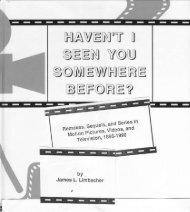DOWNLOAD Genocide in Our Time - NewFoundations
DOWNLOAD Genocide in Our Time - NewFoundations
DOWNLOAD Genocide in Our Time - NewFoundations
Create successful ePaper yourself
Turn your PDF publications into a flip-book with our unique Google optimized e-Paper software.
Chapter 3:The Issue of the Holocaust as a Unique Event 47If the Holocaust was a truly unique event,then it lies beyond our comprehension. Ifit was not truly unique, then there is nounique lesson to be learned from it.Viewed solely from the perspective of itsuniqueness, the Holocaust must beconsidered either <strong>in</strong>comprehensible ortrivial. A contexualist analysis, on theother hand, f<strong>in</strong>ds that it was neither "extrahistorical" nor just another atrocity. It ispossible to view the Holocaust asunprecedented <strong>in</strong> many respects and as anevent of critical and transformationalimportance <strong>in</strong> the history of our world.Us<strong>in</strong>g this method, we can determ<strong>in</strong>e theways <strong>in</strong> which the uniqueness questionboth helps and h<strong>in</strong>ders our quest forunderstand<strong>in</strong>g of the Holocaust.by Alan Rosenberg and Evelyn SilvermanComparability or Uniqueness. . . . . .Three Pr<strong>in</strong>cipal OptionsExplicat<strong>in</strong>g the Uniqueness QuestionWhat Constitutes Uniqueness?Contextualists. . . . . . . . . . . . . . . .The HistorikerstreitIntention Versus MethodologyInterpretive GridsConclusion. . . . . . . . . . . . . . . . . .Annotated Bibliography48484950515152525355Chapter 4: The Victims Who Survived67by Sidney M. BolkoskyStudies of survivors' testimonies thatconcentrate on the ability of the afflicted tof<strong>in</strong>d mean<strong>in</strong>g <strong>in</strong> suffer<strong>in</strong>g are at bestproblematic <strong>in</strong> the face of theoverwhelm<strong>in</strong>g force of Holocausttestimonies. To many of those whosurvived, survival was not a triumph butan unbearable burden. "Noth<strong>in</strong>g can everbe good aga<strong>in</strong>" and "All my happ<strong>in</strong>ess isgone for ever" are recurr<strong>in</strong>g motifs <strong>in</strong> theirtestimonies. The lives of survivors areforever haunted by images, sounds, andsmells that conta<strong>in</strong> om<strong>in</strong>ous questionsabout survival and about guilt for hav<strong>in</strong>gsurvived. "Why me?" and "Why was Isaved?" appear <strong>in</strong> the testimonies over andover aga<strong>in</strong>. As Elie Wiesel phrased it, thequestion is not "to be or not to be" butrather "to be and not to be." One woman,a survivor of Auschwitz, compared herselfto a hollow tree: "still alive but empty<strong>in</strong>side. " The appended diary by Agi Rub<strong>in</strong>embodies these themes of despair, guilt,and <strong>in</strong>ner empt<strong>in</strong>ess.Annotated BibliographyMajor TitlesBriefly Annotated Titles . . . . . . . . . . . . .Appendix: The Diary, by Agi Rub<strong>in</strong>,with commentary by Sidney Bolkosky72727476vlGENOCIDE



